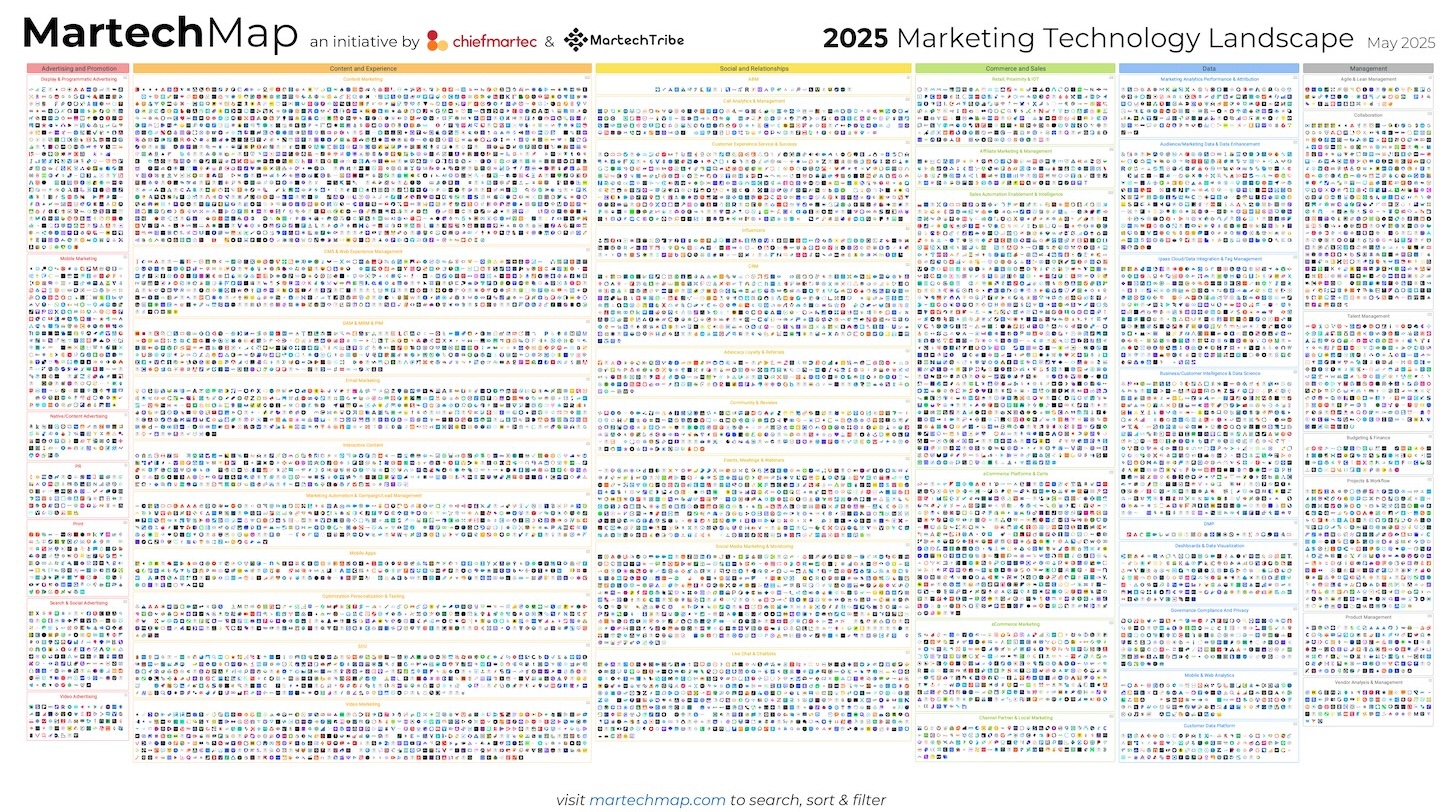The world of marketing technology, better known as MarTech, has entered a new era. In 2026, the global landscape includes more than 15,000 active solutions, reflecting the explosive pace of innovation in data, automation, and AI. For marketing leaders, this abundance brings both opportunity and complexity.
Modern organizations rely on dozens, sometimes hundreds, of tools to manage campaigns, audiences, and analytics. Yet only a third of these capabilities are fully used, leaving critical insights trapped in disconnected systems. The result: wasted spend, inconsistent reporting, and slow decision-making.
This guide explains what MarTech is, why it matters in 2026, and how to build an effective stack that connects people, processes, and platforms for measurable ROI.
Key Takeaways
- MarTech Definition: Marketing technology (MarTech) is the suite of tools that help marketers plan, execute, and measure campaigns.
- Business Value: Streamlines workflows, automates data handling, and personalizes experiences across the customer journey.
- Key Components: CRM, analytics, automation, CMS, and AI analytics platforms.
- MarTech Stack: A company’s complete ecosystem of integrated marketing technologies.
- Strategic Outcome: Unified data and automation enable faster insights, higher ROI, and stronger customer relationships.
What Is Marketing Technology (MarTech)?

In 2026, the marketing technology landscape includes more than 15,000 tools, reflecting both innovation and complexity. Marketers now rely on integrated data systems, AI analytics, and governance frameworks to manage campaigns at scale.
At its core, MarTech transforms fragmented marketing activities into a data-driven, automated ecosystem. A CRM manages relationships, a CMS powers content, analytics platforms track performance, and AI tools reveal insights – all operating together as one connected engine.
Why this matters: Customer expectations have evolved. Manual execution can’t keep up with demand for personalized, real-time engagement. MarTech provides the automation and intelligence needed to deliver seamless customer experiences at every touchpoint.
Why MarTech Matters in 2026?
MarTech empowers organizations to connect data, automate execution, and measure performance with precision across every stage of the customer lifecycle.
Below are the key reasons why MarTech plays a critical role in enterprise marketing today:
- Personalized Engagement: Advanced analytics, segmentation engines, and AI-driven personalization enable marketers to understand audiences at an individual level. MarTech platforms aggregate behavioral, transactional, and contextual data to tailor content, timing, and channel selection, driving higher engagement and conversion rates.
- Operational Efficiency and Scalability: Automation in campaign deployment, lead nurturing, and data synchronization drastically reduces manual workloads. By integrating workflows across CRM, advertising, and analytics systems, MarTech allows marketing teams to scale operations without proportional increases in resources.
- Data-Driven Decision Making: Modern MarTech ecosystems deliver unified dashboards, real-time analytics, and predictive insights. This allows marketing leaders to assess performance across channels, validate attribution models, and adjust strategy dynamically based on live data rather than assumptions.
- Customer Journey Mapping and Optimization: MarTech tools consolidate multichannel touchpoints into a single view of the customer journey. This visibility helps identify engagement drop-offs, refine nurturing sequences, and align marketing efforts with sales and customer success for full-funnel visibility.
- Integration and Interoperability: A well-architected MarTech stack ensures seamless data flow between systems, from data warehouses to campaign platforms. This interoperability supports better governance, compliance, and consistent measurement across marketing and revenue teams.
- Competitive Agility: In fast-moving markets, MarTech enables rapid experimentation and adaptation. Teams can test messaging, audience segments, and creative formats at scale, backed by automation and analytics, to quickly capitalize on emerging opportunities and maintain a performance advantage.
- Revenue Accountability: By connecting marketing data with CRM and finance systems, MarTech helps quantify marketing’s impact on revenue. This transparency strengthens cross-functional alignment and enables better forecasting, budget allocation, and ROI measurement.
Core Categories of MarTech Solutions
Despite its size, the MarTech universe can be grouped into six foundational categories. Together, these power the end-to-end marketing lifecycle.
| Category | Example Tools | Primary Function |
|---|---|---|
| AdTech | Google Ads, Meta Ads, The Trade Desk | Manages paid advertising and audience targeting |
| Content and Experience | WordPress, Adobe Experience Manager, Ahrefs | Powers websites, SEO, and customer experience |
| Social and Relationship Management | Salesforce, HubSpot, Hootsuite | Centralizes customer data and engagement |
| Commerce and Sales Enablement | Shopify, BigCommerce, Outreach | Bridges marketing and sales conversion |
| Data and Analytics Platforms | Improvado, Looker Studio, Tableau | Unifies, visualizes, and interprets marketing data |
| Management and Operations | Asana, Monday.com, Slack | Improves collaboration and campaign execution |
MarTech vs. AdTech vs. RevOps Tech
Before diving deeper into the MarTech realm, let's take a moment to understand how it relates to other closely tied terms: AdTech and RevOps Tech. While they all serve to empower marketing efforts with technology, they have distinct purposes and areas of focus.
| Dimension | MarTech | AdTech | RevOps Tech |
|---|---|---|---|
| Purpose | Manage the full marketing lifecycle | Optimize paid advertising and targeting | Align sales, marketing, and customer success data |
| Primary Data | First-party (CRM, web, email) | Third-party (cookies, DSPs) | Cross-functional revenue data |
| Key Tools | CRM, automation, analytics | Ad servers, DSPs, DMPs | Salesforce, Clari, Gong |
| Integration Focus | Marketing channels and analytics | Advertising networks | Cross-department visibility |
| Outcome | Marketing ROI and efficiency | Campaign reach and cost efficiency | Revenue predictability and growth |
Building an Effective MarTech Stack
Buying software isn’t enough. A high-performing MarTech stack is built strategically across three pillars: people, process, and platforms.
Step 1: Define Business Goals
Begin by identifying the outcomes your marketing organization is accountable for, such as brand equity, lead generation, pipeline acceleration, or retention.
Each goal should have quantifiable success metrics like customer lifetime value, attribution accuracy, or pipeline velocity. Defining these outcomes upfront allows teams to select technologies that directly support measurable performance rather than adopting tools in isolation.
Step 2: Map the Customer Journey
Develop a detailed view of how prospects move from awareness to conversion and advocacy. Identify the moments where automation, personalization, and data capture will have the highest impact, such as lead qualification, triggered messaging, or cross-channel retargeting.
Mapping these touchpoints helps ensure every technology layer (CRM, analytics, automation, or content) is configured to enhance the customer experience, not just operational efficiency.
Step 3: Audit Existing Tools
A systematic audit helps reveal redundancies, integration gaps, and underutilized platforms.
- Inventory: List all tools in use across marketing, sales, and RevOps.
- Utilization: Measure adoption rates and ROI by team or campaign.
- Integration: Identify systems that fail to synchronize data or rely on manual exports.
- Redundancy: Flag tools that duplicate functionality or fragment data.
This audit often exposes disconnected workflows and unused licenses that inflate operational costs.
Step 4: Select and Integrate New Solutions
When expanding or replacing tools, evaluate solutions through the lenses of integration, scalability, and governance:
- Integration: Ensure the platform connects seamlessly with CRM, analytics, and advertising ecosystems.
- Scalability: Confirm it can handle increasing data volume, API calls, and multi-region operations.
- Governance: Validate compliance readiness for frameworks like SOC 2, HIPAA, or GDPR.
- Enablement: Invest in training and adoption to ensure teams can extract full value from new technology.
A well-structured MarTech stack isn’t just a collection of tools—it’s an interconnected system that unifies data, accelerates insights, and drives revenue accountability across the entire marketing lifecycle.
Common Challenges in MarTech Implementation
Implementing a MarTech stack across an enterprise environment often reveals operational, technical, and organizational challenges that impact efficiency and ROI. Below are the most common hurdles marketing and RevOps teams encounter:
- Data Fragmentation: Disconnected tools and inconsistent data models create silos, preventing a unified view of customer behavior or campaign performance. Without integration, analytics and reporting remain incomplete or misleading.
- Lack of Clear Strategy: Many organizations adopt tools reactively instead of aligning technology with specific business goals. This results in overlapping functionality, underutilization, and poor ROI tracking.
- Integration Complexity: Connecting CRMs, ad platforms, and analytics tools often requires significant engineering resources. Inconsistent APIs and data schemas complicate synchronization and increase maintenance overhead.
- Poor Data Quality and Governance: Inaccurate, duplicate, or incomplete data reduces the effectiveness of automation and personalization efforts. Without governance frameworks, compliance risks also increase.
- Low User Adoption: Even the most advanced technology underperforms when teams lack proper onboarding, training, or alignment on usage standards. Adoption failure leads to wasted investment and inconsistent execution.
- Scalability Issues: As data volumes and campaign complexity grow, legacy systems and point solutions struggle to scale—resulting in latency, reporting delays, and operational inefficiencies.
- Measurement and Attribution Gaps: Many stacks fail to connect top-funnel engagement with revenue outcomes. Without end-to-end visibility, it’s difficult to prove marketing impact or optimize spend effectively.
- Vendor Sprawl and Cost Overruns: Running too many specialized tools creates redundancy and increases licensing and management costs. Consolidation and centralization are key to long-term efficiency.
The Future of MarTech: 2026 and Beyond
The MarTech landscape is evolving toward greater intelligence, integration, and accountability. As marketing becomes more data-driven and privacy-conscious, the technology stack of the future will focus less on volume of tools and more on interoperability, governance, and measurable business impact.
- AI-Powered Decisioning: Artificial intelligence and machine learning are transforming how marketers analyze data, predict outcomes, and automate decision-making. From creative optimization to dynamic audience segmentation, AI will become the core engine of adaptive marketing strategies.
- Unified Data Ecosystems: The days of fragmented stacks are numbered. Centralized marketing data platforms and warehouse-native analytics solutions are becoming the standard, allowing marketing, sales, and finance teams to operate from a single source of truth.
- Privacy-First Architecture: With global regulations tightening and third-party cookies fading, MarTech systems are prioritizing first-party data collection, consent management, and secure identity resolution. This shift is redefining targeting, attribution, and customer relationship management.
- Composable and API-First Platforms: The next generation of MarTech is modular, built to integrate seamlessly via APIs rather than operate as isolated systems. This composability enables enterprises to customize stacks that fit their exact workflows while maintaining governance and flexibility.
- Revenue-Centric Measurement: Marketing is no longer measured by clicks and impressions but by pipeline and revenue influence. Platforms like Improvado are leading this shift, connecting marketing performance directly to business outcomes through automated data integration, modeling, and reporting across every channel.
- Human + Machine Collaboration: Automation will not replace marketers, it will amplify their capabilities. As operational tasks are automated, the marketing function will increasingly focus on strategic decision-making, creative experimentation, and ethical data stewardship.
Bringing It All Together: The Road Ahead for MarTech
The evolution of MarTech marks a shift from tool accumulation to intelligent integration. The future of MarTech lies in unified data governance, cross-channel attribution, and systems that adapt in real time to customer behavior and business priorities. For organizations that can master this alignment, marketing becomes a growth engine.
This is where Improvado plays a critical role. Acting as the connective layer across fragmented tools and data sources, Improvado automates data ingestion, normalization, and unification from over 500 marketing and revenue platforms.
It transforms siloed metrics into a single, reliable source of truth, empowering marketing, sales, and RevOps teams to measure performance, attribute revenue accurately, and scale insights without manual effort. In an era defined by integration and accountability, Improvado enables enterprises to turn marketing complexity into clarity.
.png)




.png)
